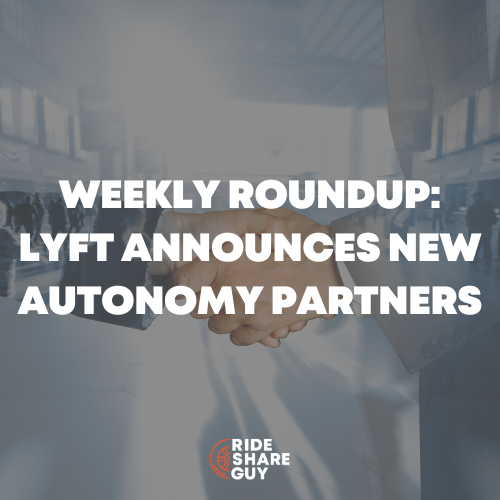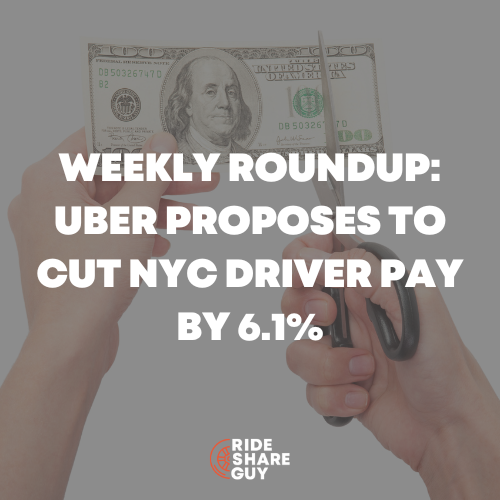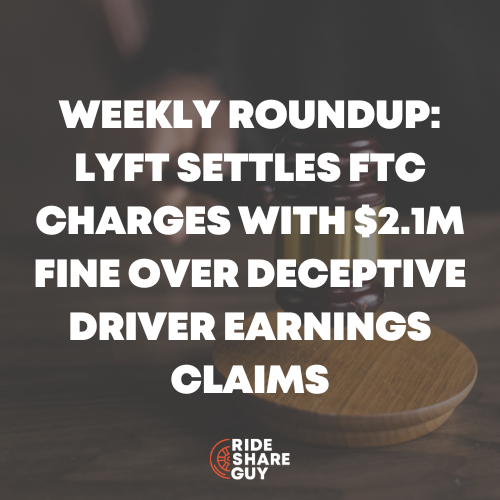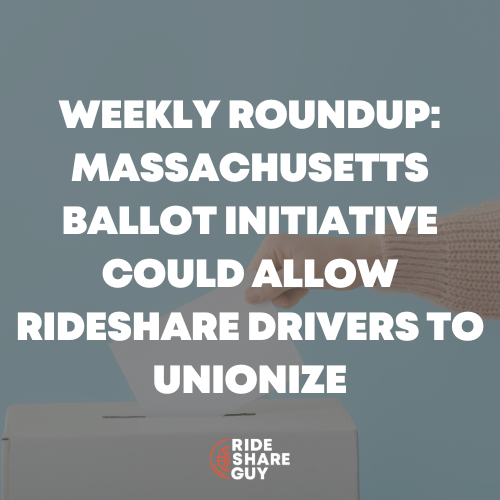In our weekly round-up, there’s more on the Lyft vs. Uber debate. Does Uber need Lyft to keep their stake in the game in order to remain competitive and keep their prices down?
Also, individual states such as Illinois and Minnesota continue to challenge Uber and Lyft over driver protections in the legislature, and the rideshare companies are not happy with either bill.
Uber Really Needs Lyft to Stay in the Rideshare Race
Topic Originally Appeared On Bloomberg
Summary
The long-held assumption about Uber Technologies Inc. has been that it would only make real money via one of two routes.
The first is self-driving cars become a reality and there’s no more need to pay human drivers. Well, forget that, ain’t gonna happen — at least not for many years.
The second scenario involves using aggressive price cuts to see off the competition before jacking up fares and cutting driver pay as soon as consumers and gig workers have few other options.
Are we at that point? Looking at the market today, you might think so. Having swiftly upended the taxi industry across the world, in recent months Uber has also stretched its domination over longtime US rival Lyft Inc., which has seen its market share fall to as little as 24% in March from around 33% pre-pandemic, according to data from Bloomberg Second Measure….
My Take
Lyft has always trailed Uber, technically. They have never had the market share in any sense of the word previous to now, but the real question seems to be, are they able to hold on to enough of their share to keep going?
It doesn’t bode well that the CEO and president (the co-founders) have cut and run. They made their millions and, from the sounds of it, left the company in a bit of a hard spot.
With Lyft going public at $72 a share and it now staying around the $11 range, that doesn’t sound good to anyone. There needs to be drastic changes to set them apart from Uber and reclaim some of their former glory.
Personally, I think if they focused more on the needs of their drivers, the performance of their drivers would improve and the experience of the customers would follow suit.
While it is important for companies like Lyft and Uber to turn a profit, at this stage of the game, I think it would be more important for Lyft to start standing out from Uber instead of copying it.
As far as Uber needing Lyft around so they can out-price them, that seems to be a moot point in my opinion, because the majority are using Uber instead as it is. Otherwise, Lyft wouldn’t be where they currently are.
Yeah, Your EV Is Green — But How Green?
Topic Originally Appeared On Lyft REV
Summary
Let’s get one thing out of the way: Buying an EV instead of a gas-powered vehicle is better for the environment. Full (regenerative-braking) stop. While you may have heard otherwise, the lifetime carbon emissions associated with EVs — including their manufacturing and charging — are lower (often far lower) than those of an average internal combustion engine (ICE) vehicle.
But while it’s true that electric vehicles produce zero emissions, they’re still a long way from being climate neutral — at least for now. Whether it’s the serious ethical and environmental issues around mining lithium, cobalt, and nickel; the overreliance on “dirty” sources of energy to power both EV manufacturing and everyday charging; or the largely unanswered question of what we’re going to do with millions of spent lithium-ion batteries, car makers and governments have some undeniably big hurdles to clear….
My Take
I’ll follow suit with the article and say, let’s get one thing out of the way: Nothing is perfect. It’ll be a long time, if ever before we are able to produce something that’s “climate neutral”.
And I say “if ever” because we’d have to start making the bodies of the vehicles out of something other than steel, aluminum, or plastic. It would have to be something long-lasting enough to be used as a vehicle for several years, but biodegradable enough to not fill up landfills and junkyards for several decades, centuries, millennia, etc.
All that being said, I truly believe we’re never going to be completely “green” when it comes to the transportation of anything. Our industrial needs are greater than that. To truly be 100% green, we’d all have to go back to walking. But then our shoes would have to be green also.
We should all just do the best we can with what’s currently available, and be willing to adjust as needed to continue doing the best we can without our means of living. As it stands, not everyone is able to afford EV options or infrastructure. But, we do the best we can in other areas.
Uber Launches Flight Bookings In The UK As A Trial For Other Markets
Topic Originally Appeared On The Verge
Summary
Uber is launching a new flight booking tool for its UK customers as part of the company’s wider efforts to expand into other travel markets. Hopper, a Canadian-based travel agency, and Uber announced the partnership to sell national and international flights through the ride-sharing app on Wednesday.
Uber has already introduced app bookings for flights for some UK users and is planning to make the tool more widely available across the entire region “in the coming weeks,” as reported by The Financial Times. Andrew Brem, General Manager for Uber in the UK, told the publication that this is “the latest and most ambitious step” that the company has taken in its pursuit to create a one-stop shop for all travel booking needs — a so-called travel “super app,” if you will….
My Take
While Lyft seems to be floundering, Uber is flourishing by continuing to offer more and more options to its customers.
Personally, it would be a while before I’d trust booking a flight through the Uber app. I am so accustomed to either booking directly with the airlines or using a website that compiles all of my options for fast booking.
It would probably be easier for Uber to partner with a company like Orbitz, Priceline, etc. as opposed to creating their own tool for booking flights.
Then it would be easier to go global as opposed to having it only available in the UK. Just a thought.
Illinois Rideshare Bill Affecting Uber, Lyft Passes Senate
Topic Originally Appeared On WGN TV
Summary
A new bill opposed by ridesharing companies Uber and Lyft is moving closer to becoming law, a move that the companies say could force them to end services in Illinois.
The bill follows a case in which a Chicago woman sued Lyft after claiming she was sexually assaulted by the driver. Lyft argued since their drivers were defined by Illinois law not to be common carriers, they were not liable for any damages.
A bill in the state capitol would remove the exemption of drivers of rideshare apps like Uber and Lyft, and lump them in with carriers such as bus drivers, train conductors, airline pilots, and taxi drivers, who have “vicarious liability”: if a bus rider for an unsafe ride sues the driver, the bus company can also be found liable for employing an unsafe driver under Illinois law….
My Take
Ok, so let me get this straight. Uber and Lyft are basically threatening to leave the Illinois market because a law (that is currently out there for similar services such as buses, trains, airlines, etc.) may be passed that holds them liable for things their drivers do. In this instance, liable for sexual assault.
I mean, to me it makes sense that the company would be held liable, especially if there is already a law or exemption in place for similar services in that state. Perhaps Uber and Lyft would then have to rethink the safety precautions that are in place for both drivers and passengers.
We’ve all said that Uber and Lyft need to put more safety precautions into place. There are too many stories out there of deaths and assaults (in both directions) for the companies to just take a “not our fault” approach.
Bill Regulating Uber and Lyft Could Hold Up the Rest of the Legislative Agenda in Minnesota
Topic Originally Appeared On Minnesota Reformer
Summary
Standing outside the Capitol on Wednesday morning, Sen. Omar Fateh, DFL-Minneapolis, made a promise to a cheering crowd of Uber and Lyft drivers.
“My commitment to you is that this will get across the finish line. It will pass the judiciary committee. It will pass on the floor of the Senate. It will pass on the floor of the House … and I’ve gotten a commitment from the governor’s office also that if this bill passes he will sign it,” Fateh said.
The bill (SF2319/HF2369) would guarantee Uber and Lyft drivers significant wage increases, better insurance coverage, and protections against being fired, or “deactivated.”
Fateh was flanked by three of his Democratic colleagues in the House: Reps. Mohamud Noor and Hodan Hassan of Minneapolis and Samakab Hussein of St. Paul. Sen. Zaynab Mohamed, while not present, is just as committed to the bill, they said….
My Take
Meanwhile in Minnesota, the legislature is working on passing a bill that will protect drivers from unfair deactivations, as well as increase wages and ensure better insurance coverage.
All of these things are great, and you’ll never hear me say a negative word about anyone wanting to improve the situations of Uber and Lyft drivers. They deserve to be treated like humans and to have basic needs covered by a reasonable wage.
Of course, Uber and Lyft don’t want these changes to come through because then they’ll have to reconfigure their bottom line and pretend like they can’t afford to treat their drivers like people and that they’ll have to increase the cost that customers pay in order to make up the difference. And yet, it somehow works in Seattle.
Let’s get everyone on the same page, with the same rights, the same pay structure, and the same protections. It’s the least these companies can do for their drivers. Without whom, their businesses would go under.
RSG in the News This Week
More trending topics in the news this week:





